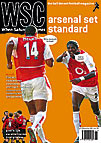 Suddenly, the midlands is full of financially stricken First Division clubs. Peter Gutteridge tries to isolate the reasons for Derby's spectacular plunge
Suddenly, the midlands is full of financially stricken First Division clubs. Peter Gutteridge tries to isolate the reasons for Derby's spectacular plunge
Rams fans can tell you that rock bottom does not exist. No matter how far you sink there is plenty of room to sink deeper. Derby County are a reported £30 million in debt and the bank is feeding in cash through an intravenous drip. We can’t even sign non-contract players until we have reduced the wage bill. We can’t reduce the wage bill because the transfer market is dead and we can’t release players because we can’t pay off their contracts. Rumour has it that two takeover bids and one refinancing package are under discussion. In four seasons we have progressed from the top half of the Premiership to relegation and the fringes of administration.
How has this appalling state of affairs come about? Derby moved to Pride Park at the start of our second Premiership season and some of the cost of financing the stadium has added to the club’s mounting debt. Yet building Pride Park is something that had to be done. Without the increased capacity and corporate revenue, we would have even greater difficulty in climbing out of the financial hole we are in.
The slippery slope began towards the end of our first season at Pride Park. After bad home defeats to Leicester and Leeds, Jim Smith seemed to lose faith in the attacking football that had made Derby an exciting team to watch; but we still finished ninth. Then his assistant Steve McClaren left and took the team’s positive attitude with him. The fans felt that if we just freshened the squad up with some new talent we could still be in Europe before long. But the 1999-2000 season started poorly and as Smith bought players and gave them long contracts the cash haemorrhage began.
The first transfer from hell was Esteban Fuertes, whose faulty passport has been written of elsewhere (WSC 187). After a lengthy search, Smith bought Belgian international Branko Strupar (£1.5 million) to replace Fuertes. Strupar had had no significant injuries before joining Derby, but suffered a succession of hernia operations, recoveries, setbacks, re-operations and an infinity of rehabilitation.
Some injuries are bad luck, but of all the long-term casualties we have had to carry, Lee Morris (£3 million) was the most avoidable. Fractured metatarsals were yet to be matters of national interest, so someone must have thought a persistently broken foot wouldn’t be a problem. We bought him anyway and Morris was in and out of hospital for 18 months. To add irony to (now healed) injury, one of Derby’s most pressing creditors are Sheffield United, who are now demanding the £500,000 appearance element of Morris’s fee.
Just two more examples will suffice: Craig Burley (£3 million) rarely played owing to poor form and long-term injuries, while Bjorn Otto Bragstad (£1.5 million) was a Norwegian international who had been playing Champions League football with Rosenborg, but got a roasting in a pre-season game against Barcelona and has hardly been seen since. Even these few examples add up to a frightening amount of money going out of the club, funded by increasing debt, with no positive impact on performance. And I haven’t mentioned a host of other players who were similarly injured or who under-performed.
A desperate short-termism took over during the last two Premiership seasons. More money departed on expensive loans such as Taribo West and Benito Carbone. The loss of form suffered by many players cannot be unconnected with constant upheaval in the coaching staff. McClaren was replaced by Ray Harford, then by Malcolm Crosby and finally by Colin Todd. With Smith reportedly contemplating retirement, no succession was in place as plans for Todd to take over were always denied.
Now that John Gregory is building the first team around former youth and reserve players, it is apparent that another slow-burning bombshell has gone off. One of the least predictable side effects of a squad over-populated with under-achievers was that the reserves won almost everything at their level. This in itself may have induced an “it’ll be right when the reserves come through” complacency in both management and fans. But Smith preferred to go to the transfer market and so the reserves stayed where they were. Abject per-formances this season against Rotherham, Wolves, Burnley and Preston have exposed the inexperience of the first team.
This has given the fans a harsh reality check. The local radio phone-in was getting calls berating the club’s “lack of ambition” even we were in the top six of the Premiership, with callers effectively demanding the board force up debt by spending. During our first three Premiership seasons the club was in its best ever financial state. Now it is anyone’s guess whether or when any kind of normality may return.
From WSC 189 November 2002. What was happening this month